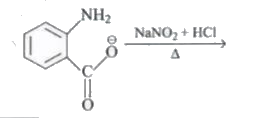Dehydration of alcohol into alkene by concentration H2SO4 involves which among the following reaction intermediate ?
Free radical
Carbocation
Carbanion
Carbene
The correct Answer is:B
To solve the question regarding the dehydration of alcohol into alkene by concentrated H₂SO₄ and the reaction intermediate involved, we can follow these steps:
1. Understanding the Reaction: The dehydration of alcohol involves the removal of a water molecule (H₂O) from the alcohol (RCH₂OH) to form an alkene (RCH=CH₂). This reaction is facilitated by concentrated sulfuric acid (H₂SO₄).
2. Protonation of Alcohol: The first step in the mechanism is the protonation of the alcohol. The lone pair of electrons on the oxygen atom of the alcohol (RCH₂OH) attacks a proton (H⁺) from the sulfuric acid. This forms an oxonium ion (RCH₂OH₂⁺).
3. Formation of Carbocation: The oxonium ion (RCH₂OH₂⁺) is unstable and undergoes a loss of water (H₂O) to form a carbocation (RCH₂⁺). This step is crucial as it generates the positively charged intermediate.
4. Deprotonation to Form Alkene: The carbocation (RCH₂⁺) can then lose a proton (H⁺) to form the alkene (RCH=CH₂). This step completes the dehydration process.
5. Conclusion: The reaction intermediate formed during the dehydration of alcohol by concentrated H₂SO₄ is a carbocation.
Final Answer:
The reaction intermediate involved in the dehydration of alcohol into alkene by concentrated H₂SO₄ is a carbocation.
The reaction intermediate involved in the dehydration of alcohol into alkene by concentrated H₂SO₄ is a carbocation.
Similar Questions
Knowledge Check
Which of the following reactions involve benzyne intermediate?
A B
B C
C D
D
Which of the following reactions involve free radical as intermediate?
A B
B C
C D
D
Concentrated H2SO4 will not dehydrate the following complex:
View SolutionWhich among the following alkenes will be most stable :
View Solutionconcentrated H2SO4 can be used to dry which gas ?
View SolutionDuring the dehydration of alcohols to alkenes by heating with conc. H2SO4, the initiating step is :
View SolutionDehyration of alcohol to alkene by heating with conc. H2SO4, the initiation step is _______ followed with ________ mechanism.
View SolutionAlcohol can be prepared from alken by which of the following reaction
View Solution
